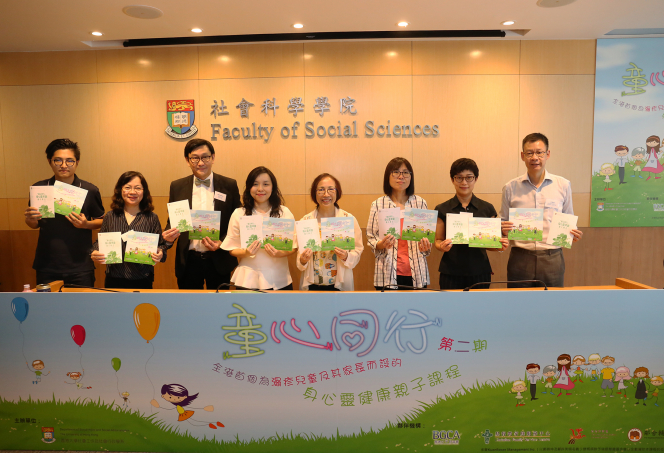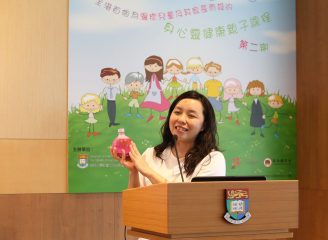Media
Hong Kong’s first psycho-social intervention programme for children with Eczema and parents - result announcement and second phase commencement
23 Apr 2018

HKU Department of Social Work and Social Administration collaborates with four welfare organisations to offer second phase psycho-social intervention programme for children with Eczema and parents
Childhood eczema has multifaceted consequence in child development
Eczema is the most common paediatric skin disease prevalent in 15-20% of children globally and 30% of Hong Kong children, estimated to affect more than 160,000 local children under the age of 14. The impact of this illness is multifold. Eczema flares creates an unbearable itching sensation, affects sleep quality (e.g. unable to sleep, mid-night waking, inadequate sleep), impacts emotion (e.g. low mood, agitation, anger), negatively influences daily performance (e.g. diminished academic and cognitive performance) as well as developmental delay (e.g. comparatively lowered body weight and short stature). Psychologically, a proportion of children with eczema suffers from low self-esteem due to negative self-image. Peers may avoid playing with them due to misconceptions that their rash may be infectious, leading to teasing, bullying and social exclusion. Stress and a sense of helplessness are common in school-age children with chronic conditions, highlighting a need to equip them with effective strategies to cope with their daily difficulties as well as to express and regulate their emotions.

Dr Celia Chan introduces the Mindful Jar, a tool to help children with eczema ease anxiety and pressure
High parental stress will affect caregiving relationship
“When the child experiences negative quality of life due to their skin condition, it affects the parents, too.” remarked Dr. Celia Chan, the “Seeing the Invisible” Program Director. “It is not only about caring for the skin itself, meal preparation, household decoration, arrangement of family leisure activities and daily expenses are heavily dominated by the skin condition.” Research has shown parents of children with moderate to severe eczema spend up to 3 hours a day caring for their children’s skin and often experience feelings of hopelessness, helplessness, guilt and depression. The parent’s sense of desperation is often projected onto the parent-child relationship and increases the risks of parental over-protection, parent-child conflict, and over dependence of children.
“Often, parents of eczema children are heavily concerned about dietary control and limit food choices for the family in order to accommodate for the eczema child.” Professor Ellis Hon, CUHK paediatric expert in skin diseases, commented “The overprotection of the eczema child may inflict resentment from other children in the family, who may feel neglected and even hurt when parents stop planning activities that could interfere with the eczema child’s skin, such as going to the beach or outdoor sports.”
Literature has shown, relative to other chronic conditions, caregivers of children with eczema reported higher parental stress. As symptom manifestation is highly unpredictable, care adjustment places a high demand on the whole family, and is likely to cause tension. “Low income families are disproportionately affected by their socioeconomic disadvantage,” Dr. Chan explained, “While some parents have to work long hours in order to afford the medical and pharmaceutical expenses, others lacks information of the disease and treatment, leading to under diagnosis or treatment of the chronic condition.”
“Seeing the Invisible” Program – The First Psychosocial Intervention Enhancing Psychosocial Well-Being of Parents and their Children with Eczema in Hong Kong
Since 2017, Dr. Celia Hoi Yan Chan and her team from the Department of Social Work and Social Administration at the University of Hong Kong, have initiated the “Seeing the Invisible” research program. The Program was developed as the first non-pharmaceutical group intervention for local parent caregivers and their children with eczema, aiming to enhance the holistic well-being for parents, the self-esteem, emotional coping and resilience of children, as well as facilitate better parent-child relationship in spite of their eczema experience.
The intervention design is based on the Integrative Body-Mind-Spirit Approach, which has been proven to be clinically effective in improving well-being of people suffering from various chronic conditions, such as psoriasis, chronic fatigue syndrome, insomnia, etc. Through the practice of exercise such as deep breathing, stretching, massaging acupressure points, emotional expression and meaning reconstruction, the program aims to improve overall well-being of both parent and the child.
Research outcome from first phase “Seeing the Invisible” program
Over 100 caregiver-children pairs completed a 36-hour group intervention workshop in the first phase programme. The findings revealed an encouraging lowering in anxiety levels and improved emotions among children participants, and a significant reduction in perceived stress and afflictive attachment, and improvement in general vitality among parent caregivers. Please click here for the findings.
Positive changes revealed in children’s drawing. Drawing 1 shows the topic “My Eczema” before the intervention program. The child describes eczema as “the descending devil who takes away the key to my social life. When people laugh at my eczema, it is indeed the devil laughing at me as well. I am very unhappy about the devil.” Drawing 2 shows the same topic drawn after the 6-week intervention. The same child seemed to have changed her interpretation of eczema, describing it as “something that itches and bleeds sometimes (like the red dinosaur), but at other times it can be gentle and happy (like the pink dinosaur)”.
“Seeing the Invisible” second phase program
The second phase program, to be commenced from July to December, 2018, will target children with eczema and parent caregivers from lower income families. Please click here for recruitment details and program schedule.
For enquiries about the program, please contact Ms Michelle Tam, tel: 39171832, or email: myjtam@hku.hk.
For media enquiries, please contact Ms. Melanie Wan, Senior Manager (Media), Communications and Public Affairs Office, tel: 2859 2600/ email: melwkwan@hku.hk.

